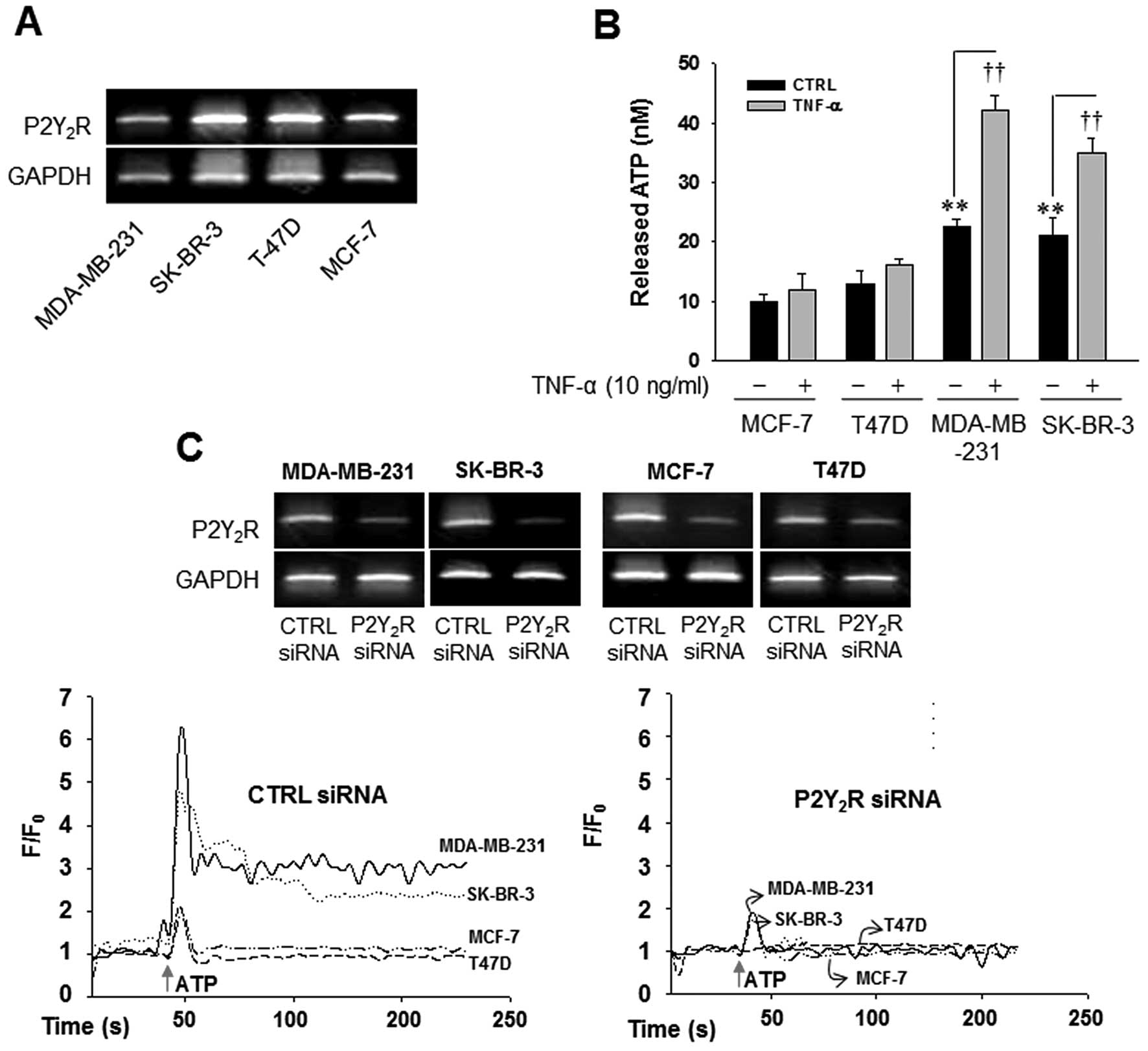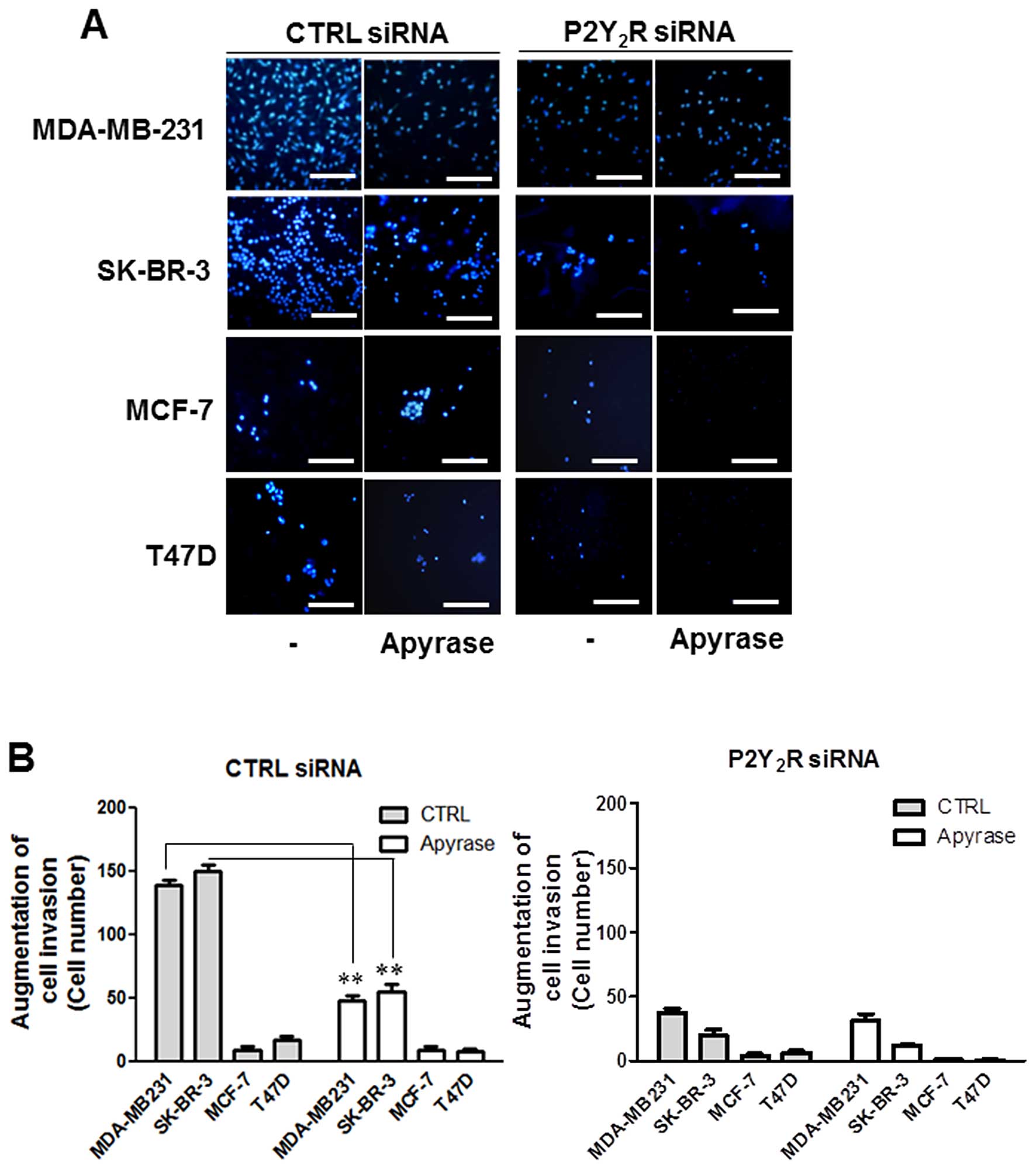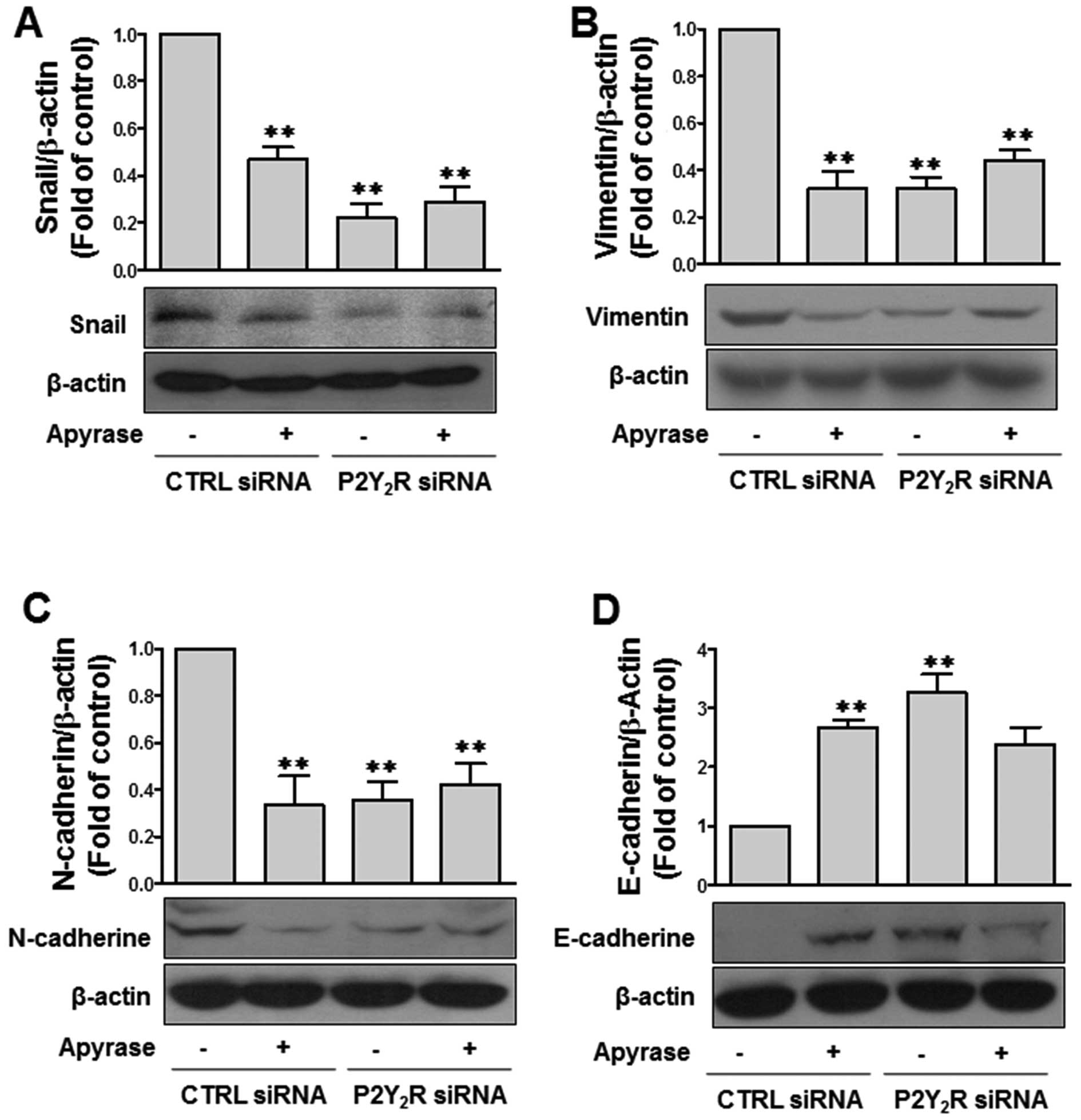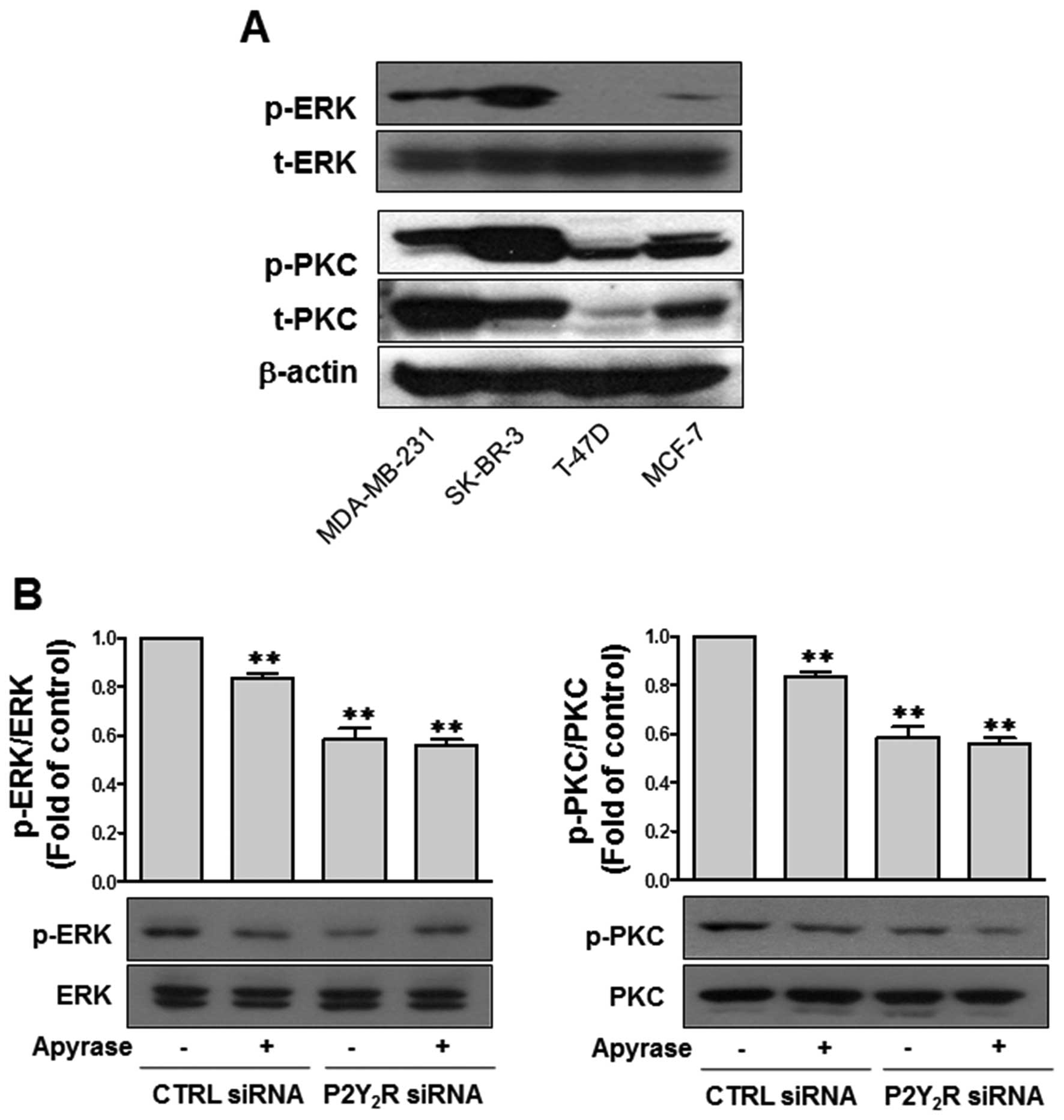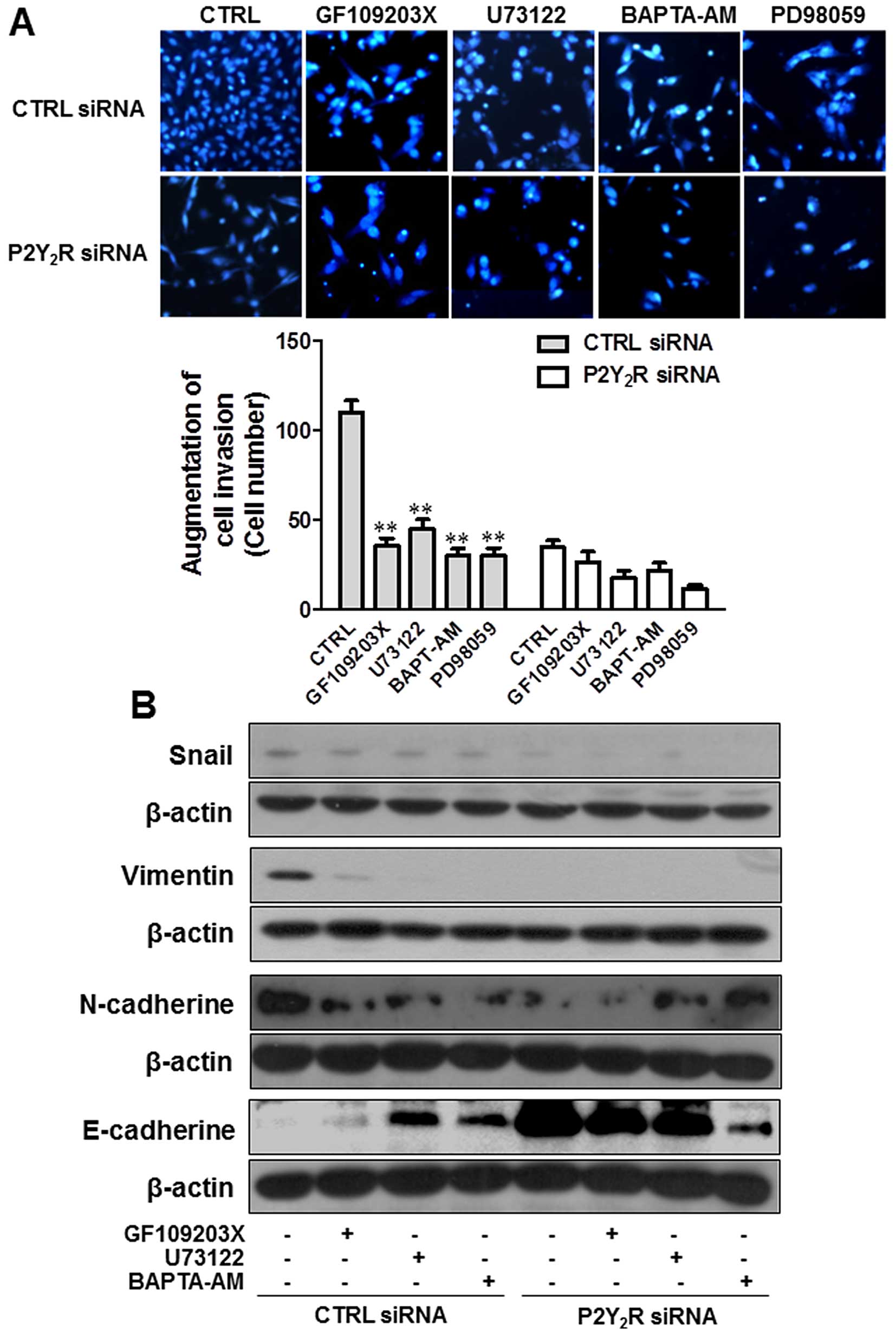|
1
|
Anandappa SY, Sibson R, Platt-Higgins A,
Winstanley JH, Rudland PS and Barraclough R: Variant estrogen
receptor α mRNAs in human breast cancer specimens. Int J Cancer.
88:209–216. 2000. View Article : Google Scholar : PubMed/NCBI
|
|
2
|
Jin H, Lee JS, Park SW, Lee JH, Chang KC
and Kim HJ: P2Y2R activation by nucleotides released
from highly metastatic breast cancer cells increases tumor growth
and invasion via crosstalk with endothelial cells. Breast Cancer
Res. 16:R772014. View
Article : Google Scholar
|
|
3
|
Joo YN, Jin H, Eun SY, Park SW, Chang KC
and Kim HJ: P2Y2R activation by nucleotides released
from the highly metastatic breast cancer cell MDA-MB-231
contributes to pre-metastatic niche formation by mediating lysyl
oxidase secretion, collagen crosslinking, and monocyte recruitment.
Oncotarget. 5:9322–9334. 2014.PubMed/NCBI
|
|
4
|
Burnstock G: Purine and pyrimidine
receptors. Cell Mol Life Sci. 654:1471–1483. 2007. View Article : Google Scholar
|
|
5
|
Bilbao PS, Santillan G and Boland R: ATP
stimulates the proliferation of MCF-7 cells through the PI3K/Akt
signaling pathway. Arch Biochem Biophys. 499:40–48. 2010.
View Article : Google Scholar : PubMed/NCBI
|
|
6
|
Schafer R, Sedehizade F, Welte T and
Reiser G: ATP- and UTP-activated P2Y receptors differently regulate
proliferation of human lung epithelial tumor cells. Am J Physiol
Lung Cell Mol Physiol. 285:L376–L385. 2003. View Article : Google Scholar : PubMed/NCBI
|
|
7
|
Schumacher D, Strilic B, Sivaraj KK,
Wettschureck N and Offermanns S: Platelet-derived nucleotides
promote tumor-cell transendothelial migration and metastasis via
P2Y2 receptor. Cancer cell. 24:130–137. 2013. View Article : Google Scholar : PubMed/NCBI
|
|
8
|
Suganuma M, Okabe S, Marino MW, Sakai A,
Sueoka E and Fujiki H: Essential role of tumor necrosis factor
alpha (TNF-alpha) in tumor promotion as revealed by
TNF-alpha-deficient mice. Cancer Res. 59:4516–4518. 1999.PubMed/NCBI
|
|
9
|
Egberts JH, Cloosters V, Noack A,
Schniewind B, Thon L, Klose S, Kettler B, von Forstner C, Kneitz C,
Tepel J, et al: Anti-tumor necrosis factor therapy inhibits
pancreatic tumor growth and metastasis. Cancer Res. 68:1443–1450.
2008. View Article : Google Scholar : PubMed/NCBI
|
|
10
|
Steeg PS: Cancer: Micromanagement of
metastasis. Nature. 449:671–673. 2007. View
Article : Google Scholar : PubMed/NCBI
|
|
11
|
Steeg PS: Tumor metastasis: Mechanistic
insights and clinical challenges. Nat Med. 12:895–904. 2006.
View Article : Google Scholar : PubMed/NCBI
|
|
12
|
Eccles SA and Welch DR: Metastasis: Recent
discoveries and novel treatment strategies. Lancet. 369:1742–1757.
2007. View Article : Google Scholar : PubMed/NCBI
|
|
13
|
Cancer Genome Atlas Network: Comprehensive
molecular portraits of human breast tumours. Nature. 490:61–70.
2012. View Article : Google Scholar : PubMed/NCBI
|
|
14
|
Prat A, Adamo B, Cheang MC, Anders CK,
Carey LA and Perou CM: Molecular characterization of basal-like and
non-basal-like triple-negative breast cancer. Oncologist.
18:123–133. 2013. View Article : Google Scholar : PubMed/NCBI
|
|
15
|
Lehmann BD, Bauer JA, Chen X, Sanders ME,
Chakravarthy AB, Shyr Y and Pietenpol JA: Identification of human
triple-negative breast cancer subtypes and preclinical models for
selection of targeted therapies. J Clin Invest. 121:2750–2767.
2011. View Article : Google Scholar : PubMed/NCBI
|
|
16
|
Keen JC and Davidson NE: The biology of
breast carcinoma. Cancer. 97:825–833. 2003. View Article : Google Scholar : PubMed/NCBI
|
|
17
|
Weisman GA, Ajit D, Garrad R, Peterson TS,
Woods LT, Thebeau C, Camden JM and Erb L: Neuroprotective roles of
the P2Y(2) receptor. Purinergic Signal. 8:559–578. 2012.
View Article : Google Scholar : PubMed/NCBI
|
|
18
|
Frogne T, Benjaminsen RV, Sonne-2 Hansen
K, Sorensen BS, Nexo E, Laenkholm AV, Rasmussen LM, Riese DJ II, de
Cremoux P, Stenvang J, et al: Activation of ErbB3, EGFR and Erk is
essential for growth of human breast cancer cell lines with
acquired resistance to fulvestrant. Breast Cancer Res Treat.
114:263–275. 2009. View Article : Google Scholar :
|
|
19
|
Zhang SS, Liu MG, Kano A, Zhang C, Fu XY
and Barnstable CJ: STAT3 activation in response to growth factors
or cytokines participates in retina precursor proliferation. Exp
Eye Res. 81:103–115. 2005. View Article : Google Scholar : PubMed/NCBI
|
|
20
|
Shin Y, Yoon SH, Choe EY, Cho SH, Woo CH,
Rho JY and Kim JH: PMA-induced up-regulation of MMP-9 is regulated
by a PKCalpha-NF-kappaB cascade in human lung epithelial cells. Exp
Mol Med. 39:97–105. 2007. View Article : Google Scholar : PubMed/NCBI
|
|
21
|
Fini ME, Cook JR, Mohan R and Brinckerhoff
EC: Regulation of matrix metalloproteinase gene expression. Parks
WC and Mecham RP: Matrix metalloproteinases. Academic Press; New
York, NY: pp. 2991998, View Article : Google Scholar
|
|
22
|
Yilmaz M and Christofori G: EMT, the
cytoskeleton, and cancer cell invasion. Cancer Metastasis Rev.
28:15–33. 2009. View Article : Google Scholar : PubMed/NCBI
|
|
23
|
Thiery JP: Epithelial-mesenchymal
transitions in tumour progression. Nat Rev Cancer. 2:442–454. 2002.
View Article : Google Scholar : PubMed/NCBI
|
|
24
|
Cavallaro U and Christofori G: Cell
adhesion and signalling by cadherins and Ig-CAMs in cancer. Nat Rev
Cancer. 4:118–132. 2004. View Article : Google Scholar : PubMed/NCBI
|
|
25
|
Martiáñez T, Lamarca A, Casals N and Gella
A: N-cadherin expression is regulated by UTP in schwannoma cells.
Purinergic Signal. 9:259–270. 2013. View Article : Google Scholar :
|















